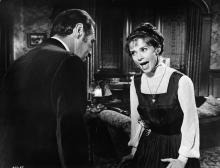Christian life

Superman was introduced on his first page as a “champion of the oppressed…sworn to devote his existence to helping those in need.” Those actions are a fundamental expression of his identity, an inalienable product of who he is. Lara and the Kryptonian scientist Jor-El loved him enough to help him break away from their planet, giving him a chance at life. The farmers Jonathan and Martha Kent raised him in a way that left him intimate with humility and human frailty. Combine those with the confidence that comes with knowing that great power is a simple fact of his anthropology, and Superman can't help but position himself alongside society’s powerless. Crime will always find him because he loves its victims.
Batman, on the other hand, does not act in response to people he loves. He acts in response to people he hates. At heart, he is still a child overwhelmed by loss and obsessed with lashing back against those that inflicted it upon him. Bruce Wayne (a name cobbled together by his writers so as to leave the reader with a fragrance of colonialism) created the Batman identity and fights crime in his home city so that he can re-shape the world as he sees fit. He was first introduced to readers as fighting a “lone battle against the evil forces of society,” and fighting that battle has always been the measure by which the character has justified his own existence.
For any Christian who cares enough about social justice to be reading Sojourner’s website, this raises a compelling series of questions: Are you working to make the world more just because you are confident that your Father loves the victims of injustice? Because your King voluntarily shared the plight of the humble? Because you know that the Spirit will make all things new and you want to be a part of giving people a foretaste of that now? Or are you pursuing justice because you’re afraid of what the world will look like if you don’t? Because you can’t see your own value if you aren't "fighting the good fight?"

I had a series a while back about the Christian Cliches that we should drop from our lexicon, and since then I’ve had people ask what they should be saying instead. So here’s a list of handy phrases to help bring followers of Jesus into a post-Christendom, 21st-century world.

I was pretty amazed by the popularity of the first lists of Christian clichés I created (linked at the bottom of this article). I think it was because so many Christians saw themselves somewhere in the list and others (maybe even some Christians!) have been on the receiving end of these clichés and resonated with my frustration in hearing them pretty much my entire life.
Since that initial series ran, I’ve been thinking about other things Christians often say that tend to do more harm than good. So here are a few more to add to the list.
Bless his/her heart: This usually follows one of two less-than-Christian kinds of statements. Either it’s said after some kind of thinly veiled insult or after a juicy bit of gossip about the person whose heart you want to be “blessed.” Examples include, “Did you hear Nancy’s husband got caught sleeping with his secretary? Bless her heart,” or, “He’s not exactly the sharpest tool in the shed, bless his heart.”
If you’re from the South, you definitely know what I’m talking about.

“Words! Words! Words!
I’m so sick of words!
I get words all day through, first from him, now from you. Is that all you blighters can do?”
So, Liza Doolittle challenges the hapless Freddy Eynsford-Hill at the height of a dramatic confrontation in My Fair Lady. Freddy has come to her rescue, with his flowery, long-winded protestations of love, but poor Liza is fed up with words:
“Don't talk of stars, burning above. If you're in love, show me. Tell me not dreams, filled with desire. If you're on fire, show me.”
And you know, Eliza has a point. A well-turned phrase won’t keep you warm at night.
It’s ironic that this drama was penned by one of the great wordsmiths of the English language. The play turns on the transformation of a poor Cockney girl into a proper English lady through the manipulation of her ability to master the English language. One argument put forth in the course of achieving this goal is that it doesn’t matter what you say as long as you say it properly. Style can compensate for the absence of substance.
In contrast, I listened this week to a powerful sermon preached by the Rev. Nadia Bolz-Weber to a gathering of some 34,000 Lutheran youth gathered in assembly in New Orleans.